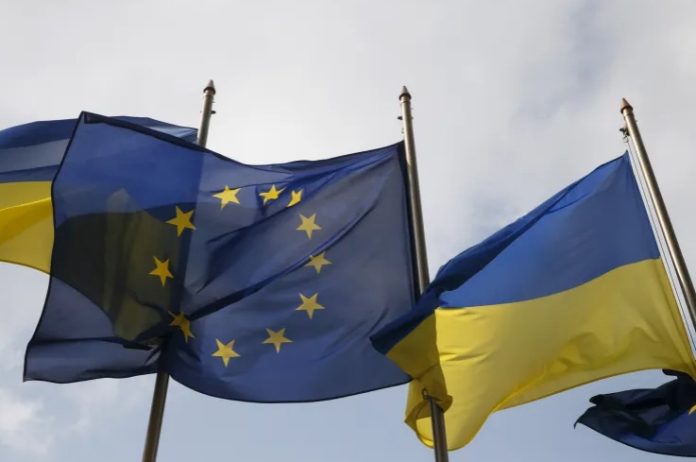The upcoming negotiations on Ukraine’s EU membership must strike a balance between lofty political aspirations and acute practical problems, ranging from subsidies to grain, The Guardian reports.
When the heads of state of the 27 EU member states meet in Brussels in December, they will have to make one of the most important decisions in EU history: whether or not to start negotiations with Ukraine on its membership of the organisation. This week, the European Commission recommended starting negotiations, which means that the European Council will almost certainly give the green light to do so. However, this does not mean that Ukraine will be able to join the EU countries any time soon. In fact, Kyiv may well find itself trapped in negotiations that lead nowhere.
One of the reasons to expect lengthy negotiations between Brussels and Kyiv is NATO’s reluctance to honour its promise that Ukraine would join the alliance. 11 of the 16 countries that have joined the EU since 1995 did so as NATO members. Membership in the alliance helps protect states such as Estonia, Latvia and Lithuania from aggression. The EU’s security and defence policy is too weak and inconsistent with security guarantees and the provision of the North Atlantic Treaty on Mutual Defence, which provides for aid and assistance to member states that have been subjected to armed aggression, but has not been tested in practice.
Even if Ukraine succeeds in joining NATO or finding other security guarantees, it will take a long time to resolve the problems associated with accepting the poorest country in Europe and one of the world’s largest agricultural exporters. The economic issues will be as complex and contentious as the issues of war and peace, as Ukraine will have to see for itself, according to The Guardian.
Agriculture may become the most painful and explosive issue in the EU negotiations with Ukraine. More than half of Ukrainian land is suitable for farming. The EU has a quarter of such land. Most of Ukraine’s arable land is chernozem. This is fertile black soil, giving farmers huge advantages in growing grain. Ukraine’s accession to the EU will lower prices for Spanish buyers, who bought 430,000 tonnes of Ukrainian sunflower oil in 2021. At the same time, farmers in Slovakia, Poland and Hungary will face increased competition. Recently, these countries banned the export of Ukrainian grain without considering Brussels’ decision. They did this as a protest against the market saturation, which reduced the incomes of local producers.
Currently, EU farmers receive annual subsidies of at least 200 euros per hectare of cultivated land. Ukraine has an abundance of arable land and a recent study shows that it would be eligible for up to €96.5 billion in agricultural subsidies over seven years. Add to that investments in road building, railways and environmental projects from the EU solidarity fund, which is designed to help the poorest member states catch up with the rest, and you get a total cost of adopting Ukraine of €186 billion. That’s more than the entire annual budget of the EU, The Guardian reports.
Financial support on this scale means one thing. Other EU countries will receive less money but will be required to contribute more to the overall budget. The EU has already agreed to lend Ukraine €18bn to help its economy, although there is a real danger of Kyiv defaulting on the loan. But it is inconceivable that EU members will forever agree to give more and receive less. Accession talks are certain to reach an impasse, and there will be no new long-term deal to limit spending on agricultural and regional aid. Such an agreement is unlikely to be signed before 2030.
By applying to join the EU, Ukraine does not just want to receive subsidies. It wants to give a powerful boost to its economy. You can understand Ukraine’s vision of a post-war future by reading its national reconstruction plan. It envisages investments to rebuild everything that has been destroyed, but not only. The plan envisages building a dynamic economy with a growth rate of seven per cent per year. It says Ukraine should be among the world’s top 20 in terms of labour. Volodymyr Zelensky’s ambitions to leapfrog over Ukraine’s previous economic model will not come cheap. They will require at least 700 billion euros for their implementation until 2032. The EU is not going to give Kyiv blank cheques, but it is expected to spend significant sums on reconstruction on top of the costs of expansion.
The third reason why Ukraine faces long and possibly fruitless negotiations with the EU is that the bloc’s member states may well change their minds. Even after the green light is given to start negotiations, it could take months and years before they can actually begin. Albania and North Macedonia have been convinced of this to their deep disappointment. Moreover, Moldova and Bosnia and Herzegovina will soon be convinced.
Even once started, negotiations can easily fail. Turkey has been convinced of this many times since 2005. When the negotiation process is over, all EU member states will have to ratify the agreed accession treaty. The stakes involved in admitting Ukraine are very high, and it is quite possible that one or more countries will want to hold a referendum on the issue. And Brexit has clearly shown that EU referendums are notoriously unpredictable.
